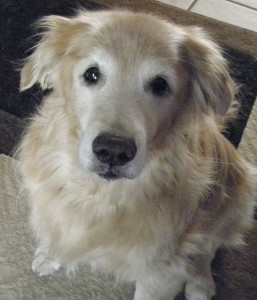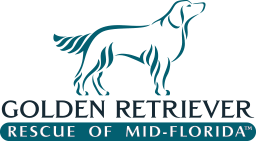Are You a Senior? Does That Mean You Can't Adopt From GRRMF?
GRRMF will adopt to senior citizens, however, certain circumstances must be met. As always, we try to balance the needs of our golden retrievers with the needs of the human caregivers.
When an applicant is age 70 and up, we will only match these homes with our older golden retrievers. Goldens are very active dogs that can live 10-12+ years. If you are 70 and adopt a 1-3 year old is it reasonable to be able to handle a golden when you are 80? We will also look carefully at the lifestyle of applicants in their 60’s to make sure it fits the age of the dog requested if they want a young dog. (see below)
If you are in your late 70’s or 80’s we have additional requirements for adoption. You must:
- be physically and financially able to care for a large dog
- be willing to adopt a senior dog 9 and up
- have a care plan in place with an adult child or friend that will step in and care for the dog in an emergency or long term situation and has the information if needed to contact GRRMF who will take the dog back into our program.
For any applicant life can change in an instant. As we get older there is even a greater chance that a health incident might change our ability to care for a dog, so we feel these precautions are justified.
Why we won’t adopt very young goldens to senior citizens:
Safety: Young goldens are very strong and can easily pull an adult down while on a walk. They are prey driven and can see a cat or squirrel and lunge toward it. Many people can be caught off guard and the dog can pull them down and drag them. Or the dog can break free and run out into traffic or just run off. Both parties can be hurt.
Exercise Level: Young dogs need regular daily exercise where they can run and play. Walks alone are not enough for most goldens. A dog park or a fenced yard must be available every day. A tired dog is a happy dog. An inadequately exercised dog can be bored or destructive. Many goldens that come into rescue are turned in because they have not been adequately exercised every day. Often senior citizens are unable to provide all the necessary activities to handle the exercise requirements of a young dog.
Life of the Dog: We believe that a dog is for life. Seniors who get very young dogs often turn them in to us because they can’t control the dog or because their life situation changes and they move into restricted communities or assisted living facilities that won’t take dogs. In some instances they get sick or pass away, leaving no one to care for the dog. While we cannot foresee every circumstance, we try to minimize the chance that the dog will need to come back into our program and be placed into yet another home.
For more information please read: Spending the Golden Years with Dogs
